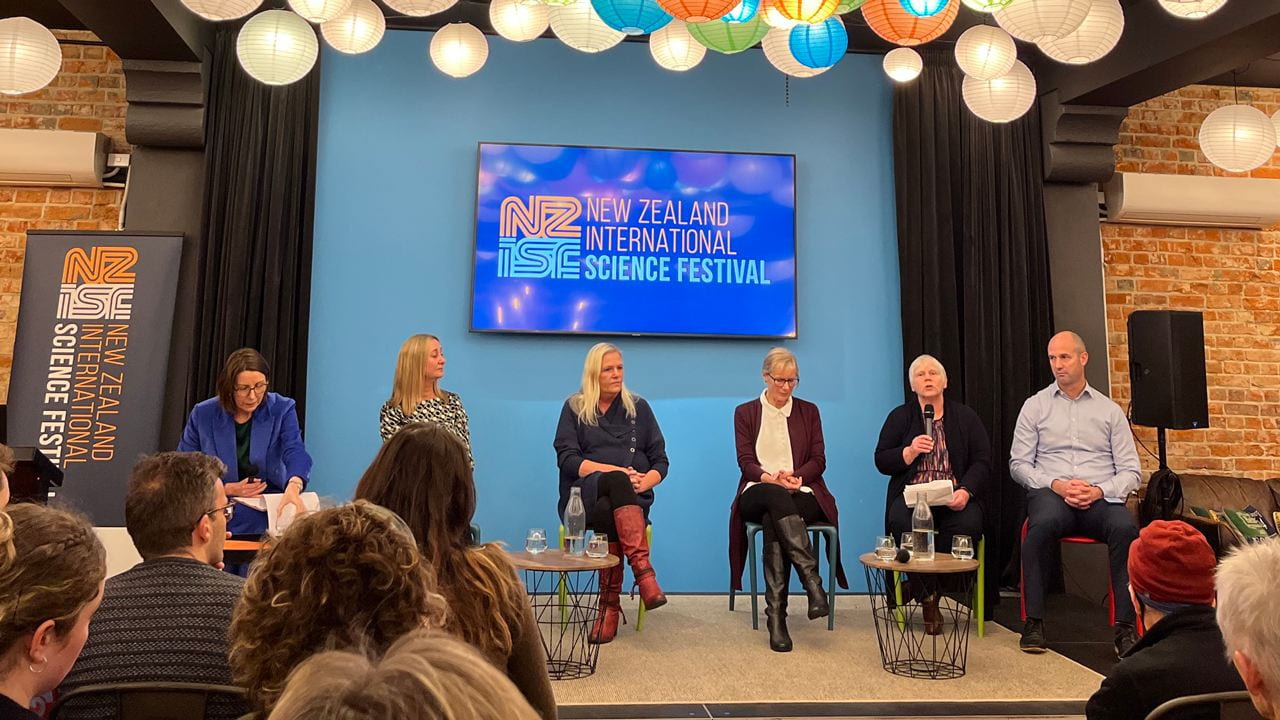A science-informed National Food Strategy is needed to safeguard the long-term wellbeing of the people and environment of Aotearoa, agree science leaders.

The six National Science Challenge directors who are calling for a National Food Strategy with Niki Bezzant at the Feeding Aotearoa panel discussion at the New Zealand International Science Festival on 7 July 2023.
The directors of six National Science Challenges call on the government to develop a National Food Strategy for Aotearoa New Zealand.
“Food is essential to our health and wellbeing but it can be a major cause of ill-health and disease,” said Professor Sir Jim Mann, director of the Healthier Lives challenge. “The food we produce also has profound effects on the environment and on climate change, and is vitally important to our economy. A healthy and environmentally sustainable food supply is essential for human and planetary health.”
As the National Science Challenges enter their final year, the six science leaders today announce their intention to bring key findings from their research together to support a future National Food Strategy.
A strategic, science-informed plan is needed to both reduce food production’s contribution to climate change, and adapt to future challenges.
“Land-use change in Aotearoa is unavoidable under a changing climate and in response to policy for freshwater protection. It makes sense to take a strategic, planned approach to redesign future food production in New Zealand in a way that has significant co-benefits for our people and our environment,” said Dr Jenny Webster-Brown, director of Our Land and Water.
“We need to prioritise the wellbeing of our people, including our farmers, and our whenua and wai, above international markets,” said Dr Webster-Brown.
Research by Healthier Lives has shown that by adopting a healthier diet, we can save lives and reduce greenhouse gas emissions. Research by Our Land and Water has shown that it’s possible to change our land use to produce the food needed for this healthier diet.
“A National Food Strategy should also recognise that food is a basic human right. We have too many people who don’t have enough nutritious food,” said Professor Cliona Ni Mhurchu, deputy director of Healthier Lives.
“At the moment we have school lunches going into some schools, and that’s a great initiative – but who’s looking at why our elderly are hungry? There needs to be a much wider perspective,” said Joanne Todd, director of the High-Value Nutrition challenge.
The science leaders point to the decline of our scallop fisheries as an example of the need for an integrated, mountains-to-sea approach. Erosion from land-based agriculture affects our shellfish species, but land management regulations and climate change policy are currently disconnected from this impact.
“Sediments from forestry and agriculture are not great for scallops, which are filter feeders, and there’s also pressure from fishing, both commercial and recreational,” said Dr Julie Hall, director of Sustainable Seas. “You’ve got to change land practices, as well as fishing practices.”
Climate change policy can also be disconnected from its wider food system impacts.
“A strategic approach would help policies work together. For example, the forests we establish to fight climate change should complement our sustainable food systems, not destroy them,” said Dr Phil Wiles, director of the Deep South challenge.
A National Food Strategy can offer clarity on New Zealand’s goals as a food producer and guardian of our population. As such, it should be co-designed by community, industry and government, and supported by science and mātauranga Māori, agreed the directors.
“The lesson we can learn from some of the overseas food strategies is that we need to take everyone with us,” said Dr Webster-Brown.
“A food strategy can help us set the national priorities together: what do we really care about as a country – for nutrition, environment, equality, and climate resilience?” said Dr Wiles.
“Food covers so much of what we do – our health, our economy, our environment,” said Todd. “A food strategy needs to be pan-government and inform all our legislation.”
“Food crosses a huge amount of our legislation, but these laws are not connected at present. If they were, we could encourage activities that are sustainable, resilient to climate change, minimise waste, and have positive impacts on society and culture,” said Dr Hall.
The National Science Challenges were established to build bodies of knowledge in areas of science considered critical to the future of Aotearoa. The six directors represent research across a broad range of food system issues, including improving nutrition and equitably reducing diet-related diseases, adapting food production to climate change, reducing food-access inequality, and reducing the impact of food production on land and at sea.
This cross-National Science Challenge initiative is an outcome of the Feeding Aotearoa panel discussion at the recent New Zealand International Science Festival.
“With many whānau struggling to access food, Matariki – a time of year intimately connected to food – seems the perfect moment to commit to the development of a National Food Strategy for Aotearoa New Zealand,” said Ruth Berry, co-director, Building Better Towns, Homes and Cities.
What is a National Food Strategy?
A National Food Strategy is a plan that guides food-related policy decisions and actions, taking into account the health, cultural, environmental and economic issues associated with the production, consumption and export of food. Canada, the UK and Australia have all consulted widely to develop overarching principles and guidance for their own food systems.
The six National Science Challenge directors
- Joanne Todd, director, High-Value Nutrition
- Professor Sir Jim Mann, director, and Professor Cliona Ni Mhurchu, deputy director, Healthier Lives
- Dr Jenny Webster-Brown, director, Our Land and Water
- Dr Julie Hall, director, Sustainable Seas
- Dr Phil Wiles, director, Deep South
- Ruth Berry, co-director, Building Better Towns, Homes and Cities